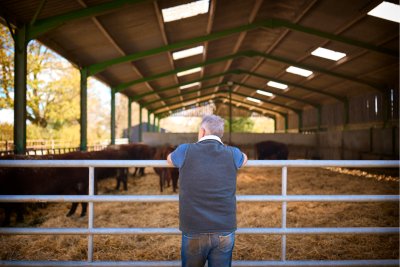Despite food and farming representing a third of total UK emissions, the government’s Carbon Budget and Growth Delivery Plan does not support farmers to lead green transition.
The government has published it's Carbon Budget and Growth Delivery Plan, rightly recognising the need to cut emissions across the economy. But it fails to deliver the necessary support to allow farmers to lead the transition to a low-carbon, resilient food system, despite food and farming representing a third of total UK emissions, and farmers managing over 70% of the UK’s land.
In response, Ruth Westcott, Sustain's climate campaign manager said:
“Farming has been completely sidelined in this plan. It’s receiving a fraction of the financial investment of other sectors, and no significant new ideas. Farmers can play a pivotal role in the green transition - now is the time to back them as climate leads.
We need farmers to be growing more of the kinds of foods that we need for healthy and sustainable diets, but there’s nothing in this plan about boosting horticulture, legumes and pulses. If we are - rightly - planting more trees and restoring peatland, how will we feed ourselves? And with many farmers facing increasing financial hardship, how can we grow an industry that is such a vital part of the solution to climate change?”
Georgina Edwards, Sustain's farming campaign officer added:
"We welcome habitat and woodland restoration as part of the plan, but there are very few positive actions that farmers can take which combine decarbonisation with food production. Methane suppressants are presented as a solution, but risk being exploited as a sticking plaster to continue intensive livestock production that pollutes our environment.
What this strategy needs to offer farmers is a viable future, with opportunities to grow the food we need for a healthy diet and a healthy planet."
Background
Food and farming are responsible for around a third of the UK’s greenhouse gas emissions. As other sectors decarbonise but emissions from food remain stubbornly high, agriculture and the wider food system are set to become the UK’s largest source of emissions by 2050.
In the sixth carbon budget, the Climate Change Committee (CCC) was clear, meeting legally-binding climate targets will require major shifts in land use, diets, and farming practices. This includes a 20–50% reduction in meat and dairy consumption by 2050, and investment in farm diversification and support for farmers like better public sector food procurement.
Measures announced in the CBGDP
The plan includes:
-
A specific Methane strategy, with agriculture representing 48% of UK territorial methane emissions. Overall, the quantified agriculture policies in the CBGDP say they will contribute 38% of the total reduction in the UK’s methane emissions from 2023 to 2030
-
The strategy confirms £2 billion a year by 2028–29 for Environmental Land Management (ELM) schemes, up from £800 million in 2023–24. These funds remain largely directed toward environmental measures, with no major changes to funding arrangements announced
-
Grants for improving farming efficiency and nutrient management, and new technologies, including at least £200 million through Farming Innovation Programme (FIP) up to 2030
-
The plan also sets ambitious targets for peatland restoration and tree planting, including restoring approximately 280,000 hectares (ha) of peatland by 2050 and establishing an additional 230,000 hectares of tree and woodland canopy
Financial commitments
Farming is set to receive a fraction of the green investment being diverted to other sectors. Agriculture and land use have a total commitment of £11.8 billion over the whole Parliament. This is dwarfed by single projects in other sectors, such as £14.2 billion for Sizewell C, £13.2 billion for the Warm Homes Plan, and £9.4 billion for carbon capture and storage. In other words, the entire farming and food production budget is similar in scale to the government’s investment in carbon capture and storage technology.
Key gaps, and risks to farmers and food security
-
The plan does not include any measures to support the commercial production of vegetables, nuts and pulses, which have been identified as key to improve UK food security and improve UK diets
-
The policy focuses on technological innovations and genetic improvements risks further intensification of livestock production, which risks worsening animal welfare and the risk of future zoonotic disease.
-
Measures to improve food security are missing - the plan includes ambitious habitat restoration targets, which will mean land taken out of food production. There are no plans to ensure the increase in production of healthy and low-GHG foods.
Recommendations:
Invest in a farming transition
-
Create a new Healthy Protein investment strategy, to support farmers to grow more healthy pulses, legumes and vegetables, and to support supply chain innovation, new product times and increasing the demand for these foods.
-
Ensure ELM schemes specifically reward reducing fossil fuel use and GHG emissions, including cutting methane and nitrous oxides.
Deliver a national food and land-use strategy
-
Integrate climate, food security, biodiversity, and rural growth into a National Food Strategy
Align diets with GHG emissions targets
-
Support a transition toward healthier, lower-carbon diets, as set out in the EAT Lancet report - with less and better meat and dairy, more UK-grown pulses, fruit, and vegetables.
-
Use public procurement (schools, hospitals, the armed forces) to drive this shift.
Back British farmers as climate leaders
-
Provide clear, long-term funding to help farmers invest
-
Ensure that food imports meet the same climate and environmental standards as UK producers.
. Copyright: monkeybusinessimages | iStock
Food for the Planet: Helping local authorities to tackle the climate and nature emergency through food.








